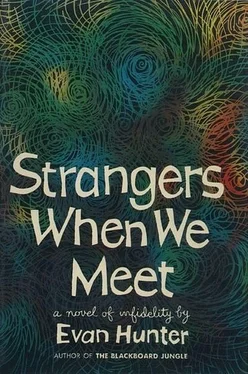“Hi,” he said.
“Hi.”
They stood in silence. He was beginning to feel the cold. He should have worn a coat.
“You have a nice tan,” she said.
“Thanks.”
“It makes your eyes...” She stopped.
“Yes?”
“Brown. Browner.”
He didn’t know what to answer. He nodded, and they were silent again, and he began to anticipate the appearance of the other neighborhood women, and found himself consciously willing their late arrival.
“Did you have a nice time?” she asked,
“Yes, very nice.”
The silence closed in again. He had the feeling that the conversation was completely undirected, that neither knew where it was leading. But at the same time he felt it would run its course without conscious direction from either of them. He could not think of a single thing to say. He realized abruptly that Margaret Gault was only a passing stranger, and he wondered why he had come to the bus stop this morning.
And then he said, “Are you going shopping again?”
“No,” she said. “Why?”
“You looked dressed up.”
“No.”
The words sprang from his mouth. “When are you going again?”
He did not expect the suspicious narrowing of her eyes, or the sudden coldness in her voice. He felt instant panic and doubt when she said simply, “Why?”
“I don’t know,” he answered, backing down.
She would not allow him to retreat. The coldness was growing in her voice. Her eyes told him he was pinned to a slide, and she was going to dissect him dispassionately. “What’s so important about my going shopping?”
But he sensed, too, that the subject could have been closed by her instantly — and it had not been. The thought came to him full blown, giving him a sudden feeling of power.
“Will you be going tomorrow?” he asked.
“Maybe.” Her answer told him he had not been wrong. She did not want to close the subject. He grinned slightly, surprised by the feeling of power which was growing within him.
“What time?” he asked.
“Why?”
“Why not?” he answered quickly. “I’ll buy you a cup of coffee.”
She started to nibble at her lower lip and then stopped. Falteringly she said, “I don’t know if I’ll be going shopping tomorrow.”
“In the morning?”
“I don’t know if I have any shopping to do.”
“The afternoon?”
“I don’t know.”
“When?” he asked, his eyes full on her face. Her eyes locked with his. They stood silent, staring at each other.
And then as if she were leaping a hurdle in slow motion, she very slowly and cautiously said, “Tomorrow’s Saturday. If I do any shopping, Don’ll be with me.” She kept staring at him steadily, as if struggling to keep his complete attention, as if trying to make certain he would not miss a word she was saying. “My husband.”
“Oh.” He paused. Somehow the hurdle had been leaped, and he felt an almost immediate relaxation of tension. “When will you go again?” he asked easily.
“I don’t know.” He thought he detected an archness in her voice, a coquettish quality which had not been there before. She smiled flirtatiously. “I hear you’re an architect.”
“Where’d you hear that?”
“One of the women. You won a prize.”
“That’s right.”
“You must be good.”
“I am,” he said. “How about Monday?”
“Monday’s a school holiday. My son is home.”
“Tuesday?”
“I don’t know. Are any of your houses in magazines or anything?”
“Yes. Is Tuesday—”
“Which magazines?”
“A lot of them. One was in September’s House and Garden .” He looked at her curiously. “Why?”
“I want to see what kind of houses you design,” she said, and he was suddenly reminded of his first meeting with Altar and the words “I want to see your stamp.” He looked at her, puzzled, wondering if the hurdle had indeed been leaped. Over her shoulder, he saw the other women beginning to appear, saw a little boy break into a trot for the bus stop.
Quite calmly, he said, “I’ll be at the center Tuesday afternoon at two o’clock. Will you be there?”
A frightened look came into her eyes. She hesitated a long time before replying, and then she said only, “Maybe.”
“I’d like you to,” he said. “I’d like—”
She interrupted, her words overlapping his. “I’ll see. Maybe. I wish I knew why—”
And one of the approaching women said, “Hello, Margaret,” and the mechanical smile appeared on her mouth as she turned away from him.
The hi-fi unit was going full blast when Larry knocked on Roger Altar’s door. He had heard the music the moment he entered the building listened to it get progressively louder as he climbed the steps to Altar’s flat. Now, standing just outside the door the sound was almost unbearable. He knocked again, harder this time, certain he could be heard by no one in the apartment.
“Come in!” Altar shouted. “It’s open.”
He pushed open the door. Altar was lying on the couch, smoking. He wore slacks and slipper socks and a dress shirt open at the throat. He did not rise when Larry entered the room, and this somehow annoyed Larry. Altar had called him the night before, while he’d been working on his recommendations for Baxter and Baxter, telling him he’d looked over the sketches and would like to discuss them. Larry had made the trip into the city this Monday morning and now that he was in Altar’s apartment he felt that Altar should at least extend the courtesy of greeting him when he arrived.
“That’s a little loud, isn’t it?” he said.
“What?” Altar answered.
“The music!” Larry shouted.
“Oh. Turn it down if you like.”
Larry walked to the hi-fi cabinet. He found the gain control and turned it all the way down. Altar still lay motionless on the couch.
“Don’t like music, huh?” he said.
“I like it fine,” Larry answered.
“But not loud.”
“I like it loud, too. But I didn’t come here for a concert.”
“What’s biting you?” Altar wanted to know.
“Nothing.”
“I hope not. I hope you’re in a good mood.”
Altar was smiling, but the smile was a crud-eating one, and Larry’s years in the service had taught him to recognize the crud-eating grin and to know what it usually preceded. He felt himself stiffening.
“Sit down,” Altar said. “Want a drink?”
“No.” Belatedly, he added, “Thanks.”
“Well, sit down anyway.”
“Sure.” Larry sat in the easy chair to the left of the bar unit, facing the blue couch upon which Altar still sprawled.
“I don’t like to do this,” Altar said. “I don’t like it when it’s done to me, and Christ knows it’s done often enough. But I think there’s a difference here, and if I’m wrong I’ll apologize. Can I talk to you like a man, Larry? Or do I have to give you the schmaltz?”
“What do you mean?”
Altar shrugged and blew out cigarette smoke. “A bad review is a bad review. No matter how you slice it, it adds up to rejection, and nobody likes being shoved away from the breast. I don’t like bad reviews, and I’ll probably never like them. But I prefer the ones that give it to me straight from the shoulder without the gingerbread.”
“Spit it out, Altar.”
“Your sketches stink.”
The room was silent except for the muted cello tones coming from the phonograph.
Altar started to say, “Maybe you’re the kind who needs the schm—” and Larry interrupted with, “This is your considered opinion, is it?”
“I’m not trying to hurt you, Larry,” Altar said. “I wouldn’t have opened my mouth if I thought you’d get sore.”
Читать дальше












